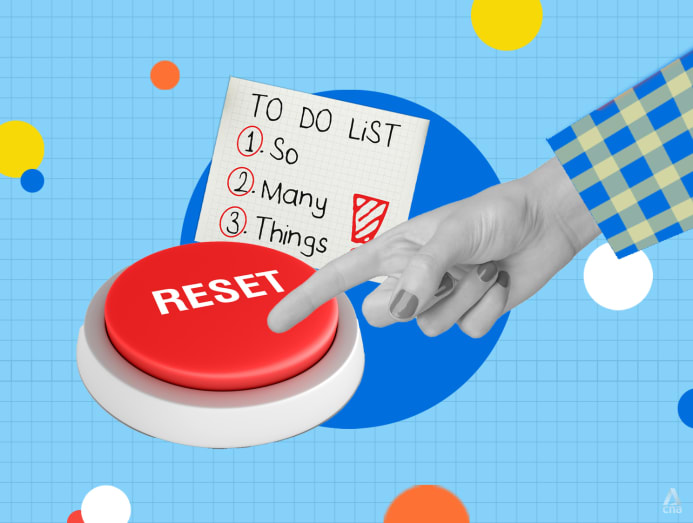Ways for women: 5 tips for mothers preparing to go back to work after maternity leave
It’s hard to imagine being back in the corporate world when you’ve spent a few months at home as a new mother. Here are some things working mums need to take note of, in this fourth instalment of the Ways for Women series, featuring tips for women to navigate life, relationships and health.

Returning to work after maternity leave is not like going back to the office after a long holiday – your whole life has changed and you are now a different person with different priorities. (Art: Jasper Loh)

This audio is generated by an AI tool.
Going back to work after maternity leave can be daunting for a working mother. It’s normal to feel a mix of emotions, including anxiety and excitement. Plus, there’s the struggle of leaving your baby for most of the day, after being with them practically 24/7 during the first few months of their life.
Apart from adjusting to getting back into work mode and practicalities like remembering your passwords or gelling with new colleagues, other challenges include dealing with the logistics of who looks after your baby, as well as being on the ball mentally despite being sleep-deprived.
And, if you’re breastfeeding, you’ll have other items to add to your list of concerns, such as what facilities are available at the office, and how you’ll find time to express your milk regularly during the work day.
However, with proper planning and a good support network, there are ways to turn this transition into a less overwhelming one.
1. RESET YOUR EXPECTATIONS

The most important thing to adjust is your mindset. You might think it will be like going back to the office after a long holiday but the fact is, your whole life has changed and you will be returning to work as a different person with new priorities.
Eugenia Ng, director of recruitment consultancy Michael Page Singapore, acknowledged that “life as a new mum is far from easy”.
It’s not just about mastering time management but also navigating the uncertainties that come with your baby’s sleep schedule, growth spurts, or sickness – all while juggling your work priorities, ambitions and mental wellness, she said.
“The best advice for any new mum transitioning back to work is to reset your expectations,” said Ng. “This isn’t about compromising but temporarily adjusting your outlook until you and your family adapt to your work schedule and commitments.”
Allowing yourself this grace period can make the transition smoother for everyone involved, she added.
Recognise that it will take some time for you to fall back into a comfortable work routine so don’t expect to be well-adjusted in the first week or even the first month.
You might also need to change the way you work. For example, if you were always working overtime pre-baby, delegate tasks if possible or make to-do lists that boost efficiency so you’ll limit having to stay past office hours.

It’s not just you taking a big step, your family will be affected by this new normal too. And it’s not just your spouse, new baby and any other children you might have. Other family members and caregivers involved in your child’s life may have to step up too.
Ng explained that a strong support system at home is essential for new working mums. Knowing you have reliable help can ease your mind, allowing you to focus and make the most of your time at work.
“It’s important to remember that the adjustment isn’t just for the mum – it’s a shift for the entire family ecosystem,” Ng told CNA Women.
If your baby will be looked after by grandparents, have conversations with them early on about schedules like nap and feeding times so you can be more confident about how your child is doing when not with you.
Also, talk to your partner about how your roles will shift. If you’re usually the one managing the household and helper, have a chat about how you can both work together to create a new routine that works for the family.
3. DO A PRACTICE RUN

This might be the first time you’ll be away from your child for an extended period of time so you need to be ready to deal with this separation. It might get too intense if day one of returning to work is the first time you’re apart for several hours.
This is why it’s important for your family to organise practice runs, so everyone gently eases into this upheaval.
“Returning to work after spending months with your baby can trigger intense separation anxiety, compounded by the hormonal changes many new mums experience,” Ng explained.
“A helpful way to prepare is by doing practice runs. Start with short breaks away from your baby, perhaps an hour or two, and gradually extend this time to three, four or even eight hours.
“These trial runs can ease the emotional challenges of separation and help both you and your baby adjust to the new routine,” she added.
Returning to work after spending months with your baby can trigger intense separation anxiety, compounded by the hormonal changes many new mums experience.
This is also an important step if you’re sending your child to a childminder – it will give both baby and adult time to adjust to each other, in small spurts at a time.
Emotional aspects aside, your practice run should also involve getting back to a work routine. Wake up at the time you will be once you’re back at the office, get dressed as if you’re going to work, then drop your baby off with their caregiver. You could even make the trip to your office to get the feel of the traffic or public transport conditions at that time, then go back home.
If you’re breastfeeding and need to set up a pumping schedule, put this in place too, including planning how and where you’ll store your expressed milk, and how you’ll transport your daily stash back home. Also consider how you will wash and sterilise your breast pump for your subsequent pumping sessions at work.
This gives you a more realistic picture of what your new life will look like and ascertain if you’ll need to make any variations to your routine.

Find out from your company what support is available for new mums. Ng pointed out that this could be invaluable.
For example, are there nursing rooms or do you have to book a meeting room when you need to express milk? Are flexible working hours possible at first to ease back into work mode and is there a support network, whether formal or informal, for new mums?
“While every mum’s journey is unique, the challenges often share common threads,” said Ng. “Building a support group at work with fellow mums can provide a safe space for sharing tips, advice and encouragement. These groups can also serve as a vital source of strength, empowering you to achieve your personal and professional equilibrium.”
Surrounding yourself with people who understand can make the journey back to work less daunting and more rewarding, she added.
5. FIND THE RIGHT BALANCE AND BE PRESENT

You need to remember to be kind to yourself. It will be normal to feel "mum guilt" and not be able to concentrate on work 100 per cent of the time, as you worry about how your baby is doing. Focus on your work during office hours and cherish the time you spend with your child, not thinking about work reports or deadlines.
Ng noted how motherhood teaches you the true meaning of dynamism, especially as you navigate the unpredictable journey of returning to work. Each day can bring unique challenges – nights with little sleep, long feeding sessions and exhaustion – all while the world seems to carry on seamlessly with schedules, deadlines and social expectations, she said.
“My advice is to openly express the help you need, whether that means requesting flexible hours, postponing a promotion or adjusting your workload until life feels more settled,” she said. “Every mum’s journey is unique and it may even differ with each child.
“Finding the right balance is key to feeling fulfilled in your career while embracing your roles as a mum and partner. Over time, you’ll grow your capacity to handle more, eventually achieving harmony between personal and professional growth."
CNA Women is a section on CNA Lifestyle that seeks to inform, empower and inspire the modern woman. If you have women-related news, issues and ideas to share with us, email CNAWomen [at] mediacorp.com.sg (CNAWomen[at]mediacorp[dot]com[dot]sg).






